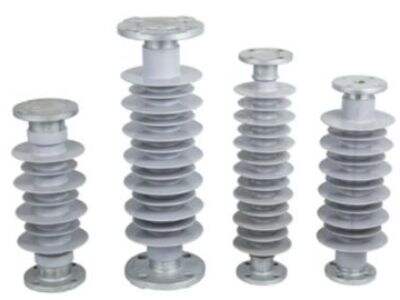Power lines may appear to be scrawny sticks from far away, but trust me — they are far larger and much more complex than you would think! Powerlines are supported by special pieces known as insulators that allow the electricity to move freely and safely. Insulators are the circular, multicolored tubes or discs that embrace the power line and hold it in place. They function as bouncers, holding electricity in the cell so it doesn’t permeate into the air or the ground, which can be extremely unsafe.
The most insulators are hard material like glass or ceramic. Others are made of plastic and fiberglass, however. These types are referred to as composite insulators and have been gaining popularity over the last few years. One of the reasons for their popularity is that composite insulators are lighter than ceramic insulators. They are less likely to crack or break, if a strong force is applied to them.
Because composite insulators are still more durable than glass or ceramic insulators, they must also be maintained sufficiently so that they continue to function properly. It is so important to take care of them! Read the below tips on maintaining composite insulators to remain strong and function well for decades to come.
Details on cleaning of Composite Insulators
Cleaning of composite insulators is a crucial habituate to increase its strength and enhance safety. But when insulators become dirty, they can lose their grip on the powerline, which can weaken them. Dirt, dust, and grime can also wear off the insulator's rubber coating over time, damaging what's below it.
Water & mild soap solution toepassing for cleaning Composite insulators. This will strip off dirt without harm. Be careful not to use rough or abrasive materials (including steel wool or scouring pads), as these can scratch the surface of the insulators. Also avoid high-pressure water jets or steam-cleaning equipment because incorrectly used or with too much pressure, these can crack or break the insulators. Rinse the insulators well after washing; all soap suds must be removed. Also, avoid allowing water to pool around the insulator’s base: over time, this can [...] weaken it. You may find that certain insulators—those in particularly dirty environments (e.g., near busy roads)—will need to be cleaned more frequently than others.
Protection of Composite Insulators against Environmental Issues
Dirt and grime are not the only factors that can damage your composite insulators if you’re not careful. Weather can change a lot in a short amount of time! One day the sun is shining on your powerline, the next it is raining and windy. Composite insulators can be adversely exposed to these environmental features.
For example, UV radiation from the sun can cause the rubber coating of the insulator to crack and deteriorate over time, exposing the underlying composite material to attack. Rainfall can also corrode and rust metal parts of the insulator, while strong winds or hail damage them or even knock them from the line altogether.
Special coatings and sealants are often used to protect composite insulators from these environmental factors. They protect the insulator against weather elements. You can also place weather caps on the insulators to offer additional protection from rain, wind, and sunlight. Checking the insulators regularly is also very important in order to see if there are signs of degradation such as ballooning or peeling.
A Study on Systematic Maintenance of Composite Insulators
It is better to avoid the problem than to fix it later! That’s why working on the preventive care of your composite insulators can prevent more serious problems later. Here are some methods to ensure your composite insulators are robust and secure:
Clean Insulator Regularly: Keeping pollution levels low will improve insulator efficiency;Dirty insulator will lead electricity leakage.
Manage the Growth of Vegetation: Monitor any shrubs or trees near power lines. When any part of a plant comes in contact with an insulator, it can weaken the insulator or even cause a power failure. Suggestion: Trim branches or leaves that touch or grow too close to the insulator regularly.
Damaged signs: Watch for contamination or corrosion of the insulators or materials surrounding them. If you discover any problems, act promptly to address them.
Considerations for Testing and Inspection of Composite Insulators
Regular inspection of your composite insulators is critical so you can monitor their health. The tests here help to detect any changes or failures on the surface of the insulator or inside the composite material.
Generally, inspectors use an array of techniques to evaluate the condition of composite insulators, such as:
Visual Inspections: The closer, the better, but they work from far away with binoculars or spotting scopes for signs of obvious damage.
Metal Checks : They check if there's any rust or corrosion is on the metal parts.
Inspection for Rubber Coating: They inspect the rubber coating of the insulator for cracks, scratches, and loss of material.
Best Example of a Sentence: They conduct tests of the composite materials such as flashover, puncture and tracking resistance.
Properties Analysis: They also test the different parts of the insulator for surface hardness, density, and air void content.
Best Practices For Safe Repairing And Replacing Of Composite Insulators
Composite Post Insulator with a long service life need maintenance or replacement if they are damaged or worn. Never attempt to fix or replace composite insulators yourself; it is dangerous. Always contact a professional like THIM engineer or electrician to carry out work for you.
This will help the composite insulators remain strong and functioning by making sure that they are properly maintained, inspected, and tested. That will mitigate the risk of a power outage or other safety concern in your area. We hope these tips have helped you or have answered a few questions about your composite insulators. Take care of yourselves and your insulators!














































